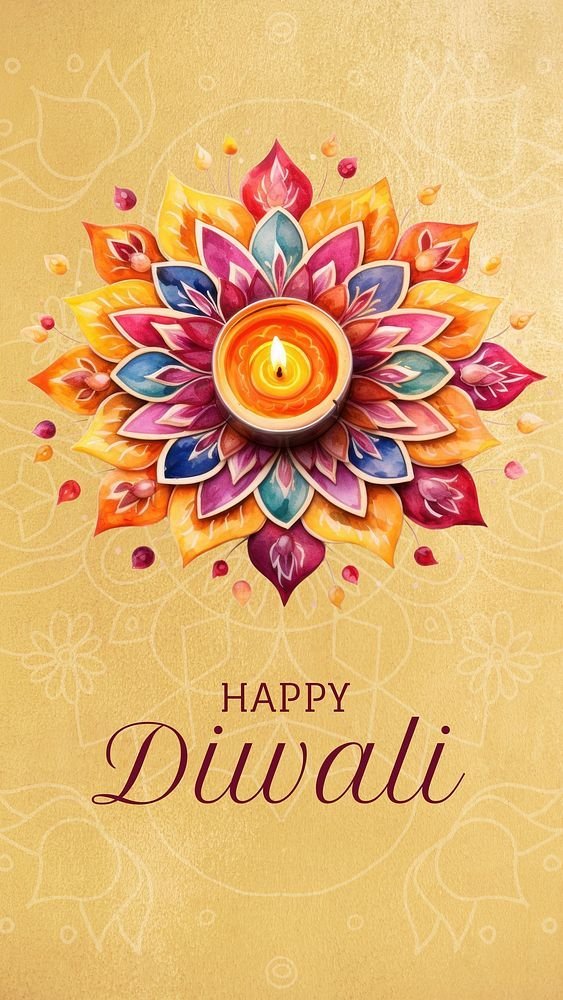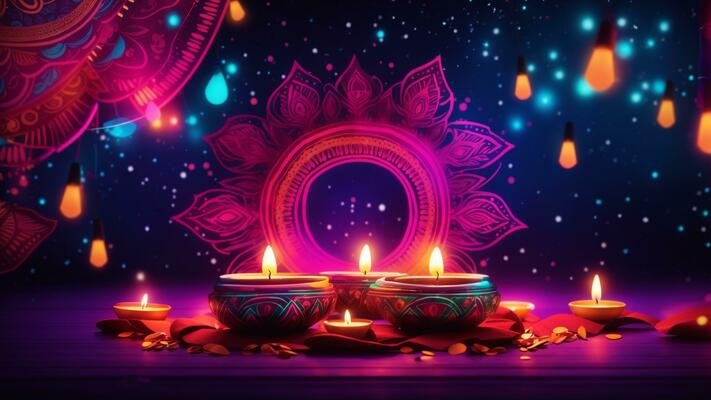
Diwali, also known as “Deepavali,” is an ancient festival of the Indian subcontinent. It is primarily rooted in Hindu traditions but is also celebrated by Jains, Sikhs, and some Buddhists. This festival represents the triumph of light over darkness and good over evil, spreading joy, prosperity, and harmony. On this occasion, people illuminate their homes, temples, and streets with lamps, candles, and colorful lights.
Historical and Religious Significance of Diwali
The historical significance of Diwali is rooted in Hindu scriptures, particularly the epic Ramayana. According to traditional accounts, Diwali commemorates Lord Rama’s return to Ayodhya after his victory over the demon king Ravana. To celebrate his return, people lit lamps, symbolizing the victory of good over evil—a central theme of Diwali.
The Five Days of Diwali and Their Significance
Diwali is celebrated over five days, with each day carrying unique significance:
- Dhanteras (Day of Prosperity)
The first day of Diwali, Dhanteras, is seen as a time of wealth and prosperity. On this day, people buy new utensils, gold, silver, or other items, as it is considered auspicious. - Naraka Chaturdashi (Small Diwali)
The second day, also known as Small Diwali, is dedicated to removing evil and darkness. People clean their homes and light lamps on this day. - Diwali (Main Festival Day)
The third day is the main Diwali celebration. People decorate their homes with rangoli, light lamps, and worship Goddess Lakshmi for blessings and prosperity. - Govardhan Puja (Celebration of Abundance)
The fourth day is dedicated to Lord Krishna’s miracle of lifting the Govardhan Hill to protect the villagers. This day is celebrated to seek prosperity. - Bhai Dooj (Celebration of Sibling Bonds)
The fifth day, Bhai Dooj, celebrates the bond between brothers and sisters. Sisters pray for their brothers’ long lives, while brothers give gifts in return.
Diwali Traditions and Their Purpose
Diwali traditions—lighting lamps, worship, decorating with flowers, and sharing sweets—symbolize joy, purity, and goodwill. These acts aim to spread light both physically and spiritually. Fireworks are also a traditional part of the celebration, though in recent years, eco-friendly Diwali celebrations are encouraged for environmental protection.
Social Aspects of Diwali and the Spirit of Brotherhood
Beyond its religious significance, Diwali is an occasion that strengthens social bonds. People exchange sweets and gifts, enhancing closeness among family members and friends. Acts of charity and helping the less fortunate are also integral to Diwali, promoting compassion and generosity in society.
Environmental and Social Aspects of Diwali
Diwali festivities can pose environmental challenges, as fireworks create air pollution, affecting both health and nature. Due to this, there is a growing movement towards celebrating eco-friendly Diwali, allowing people to enjoy the festival while protecting the environment.
Conclusion
Diwali is a beautiful festival that promotes joy, hope, and blessings. It reminds us that light always conquers darkness and good prevails over evil. Diwali encourages everyone to abandon negativity and embrace kindness, charity, and love. By embodying its message, we can create a more peaceful and harmonious society.
Message from the Humanities Advanced Studies Institute (HASI)
On this joyous occasion of Diwali, the Humanities Advanced Studies Institute (HASI), New Delhi extends warm greetings to everyone. Our institute supports the spirit of Diwali, emphasizing the victory of goodness and light, essential for fostering humanity and social harmony. HASI wishes you a very happy Diwali—may this festival bring joy, peace, and prosperity to your life, and may it reinforce the values of humanity, love, and brotherhood among all of us.


On this special occasion of Diwali, we warmly greet our Hindu brothers and friends. Diwali, symbolizing light, joy, and peace, provides a chance to bridge differences between Muslims and Hindus. It allows both communities to come together, share happiness, and strengthen bonds of goodwill and unity. Thus, Diwali not only brings joy to the Hindu community but also promotes harmony and peace between us all.
“Wishing you a joyous Diwali filled with light, happiness, and prosperity. May this festival bring peace to your home and warmth to your heart. Celebrate the victory of light over darkness and good over evil. Happy Diwali!”